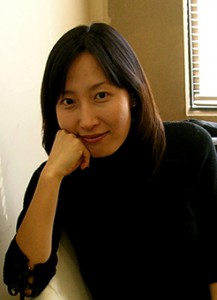Reporter: John Cheng (Year 3, School of Journalism and Communication)
 Six months ago, Professor Kim Sora gave up her tenured post in a renowned American university to work in Hong Kong, a foreign city with foreign culture. She has taken the road less travelled, but she is willing to accept the challenge because she believes there are things one should pursue in life.
Six months ago, Professor Kim Sora gave up her tenured post in a renowned American university to work in Hong Kong, a foreign city with foreign culture. She has taken the road less travelled, but she is willing to accept the challenge because she believes there are things one should pursue in life.
Professor Kim was a marketing communication manager and worked with IT companies like Microsoft and IBM in Korea. Her work experience motivated her to pursue a PhD degree in the area of corporate communications in the United States. “It helps me think how I can make corporations be more socially responsible, not like only thinking about making profits.” Throughout the years of research, she has discovered that corporate social responsibility is closely related to crisis communication. “A lot of corporations are doing CSR (Corporate Social Responsibility) after they experience crisis. They want to restore their image, not for genuine motives. After crisis, they are making donations and things like that, and it makes people suspicious.”
She is also interested in investigating effective strategies for crisis communication. “There are two routes. When the company does not have a very high reputation, crisis happens, sometimes people don’t have any expectation for the company and since the expectation is very low at the beginning, after crisis there is not much change. The other route is that I trust the company very much and it has good reputation, even if crisis happens, I still believe in the company. Both are possible.”
Professor Kim never expected to move to Hong Kong. “I got tenure at the University of Florida. It’s hard work, you have to show your teaching and research record. So everybody was asking why, she got tenure and then gave up. It’s a very bizarre situation,” she says. Against all odds, she made the decision to come to Hong Kong. “I figured getting tenure is important, but finding your personal life is more important. Usually in the United States what I did was going to school and working and working. I always work. The life was very simple in the United States. I didn’t have any family there, I was alone, so I figured if I come to Hong Kong there are much more things to do. It’s gonna be fun and more dynamic.” Also, as Hong Kong is closer to Korea, she can visit her family more often.
Professor Kim is currently teaching Social Media and Crisis Communication for undergraduates and Corporate Communication for postgraduates. Life in Hong Kong is as satisfactory as she had imagined. “There are very good and diverse restaurants in Hong Kong, and I love dim sum and hot pot.” She loves the campus of CUHK a lot. “I was very surprised, because it’s bigger than I thought. At first I was a bit confused, but now I can walk down from my office to University Station. I see lots of trees, and the sun, and I figured this campus is quite pretty. I didn’t notice before walking down there!” She also loves her students. “They are very vocal, very engaging and smart. They are always one step ahead.”
She also notices some differences in the media environment between Hong Kong and Korea. “In Hong Kong there’re not many media. There’s basically just one big TV station. But in Korea, even for the national TV channels there are more than 10, and for the cable TV there are 30-40. The competition is high.”
She firmly believes in “work hard, play hard” and encourages students to do the same. “Just studying only doesn’t make their life pretty. They need to play hard during college years and experience a lot. Visiting other countries and meeting different people, eating different food, and experiencing something different by themselves, that’s actually extending boundaries. If you have no boundaries, you are actually increasing your chances to succeed.”


 Follow
Follow